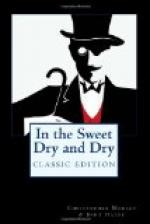From a house-top farther up the street Dunraven Bleak watched them come. He had taken Quimbleton’s word seriously, and with his usual enterprise had rented a roof overlooking the Boulevard, on which several members of the Balloon staff were prepared to deal with any startling events that might occur. A battery of telephones had been installed on the house-top; Bleak himself sat with apparatus clamped to his head like an operator at central. Two reporters were busy with paper and pencil; the cartoonist sat on the cornice, with legs swinging above two hundred feet of space, sketching the prodigious scene. The young lady editor of the Woman’s Page was there, with opera glasses, noting down the “among those present.”
It was an awe-inspiring spectacle. Between sidewalks jammed with silent and morose citizens, the Pan-Antis passed like a conquering army. The terrible Bishop, the man who had put military discipline into the ranks of his mighty organization, rode his horse as the Kaiser would have liked to ride entering Paris. His small, bitter, fanatical face wore a deeply carved sneer. His great black beard flapped in the breeze, and he sang as he rode. Behind him came huge floats depicting in startling tableaux the hideous menace of the gooseberry. Bands blared and crashed. Then, rank on rank, as far as eye could see, followed the zealots in their garments of white. Each one, it was noticed, carried a neat knapsack. Huge tractors rumbled along, groaning beneath a tonnage of tracts which were shot into the watching crowd by pneumatic guns. Banners whipped and fluttered.
The sound of shrill chanting vibrated in the blazing air like a visible wave of power. These were conquerors of a nation, and they knew it. A former bartender, standing in the front of the crowd, caught Chuff’s merciless gaze, wavered, and swooned. A retired distiller, sitting in the window of the Brass Rail Club, fell dead of apoplexy.
Bleak trembled with nervousness. Had Quimbleton hoaxed him? What could halt this mighty pageant now? He was about to telephone to his city editor to go ahead with the one o’clock edition as originally planned. ...
From the sky came a roar of engines that drowned for a moment the thundering echoes of the parade. The three gray planes, which had been circling far above, swooped down almost to a level with the tops of the buildings. One of these, a huge two-seated bomber, passed directly over Bleak’s head. He craned upward, and caught a glimpse of what he thought at first was a white pennant trailing over the bulwark of the cockpit. A snowy shag of whiskers came tossing down through the air and fell in his lap. It was Quimbleton’s beard, torn from its moorings by the tug of wind-pressure. Bleak thrust it quickly in his pocket. As the great plane passed over the head of the parade, flying dangerously low, every face save that of the iron-willed Bishop was turned upward. But even in their curiosity the rigid discipline of the Pan-Antis prevailed. Now they were singing, to the tune of “The Old Gray Mare,”




